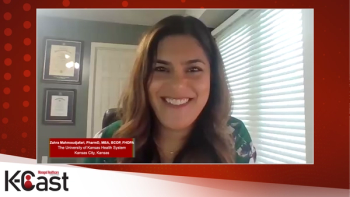
New Treatments for Difficult-To-Treat Lymphomas Are on Their Way
The FDA has approved two CAR-T therapies and a review of bispecific antibody is underway.
The treatment options for lymphomas that are difficult to treat are increasing, including to two CAR-T therapies.
Cost stands to be an issue as the CAR-T therapies are among the most expensive treatments on the market.
With the new indications, Breyanzi now has the broadest patient eligibility of any CAR-T therapy for relapsed or refractory LBCL, BMS said in a
Breyanzi was first approved early last year as treatment for certain types of non-Hodgkin lymphoma, including diffuse large B-cell lymphoma (DLBCL). News reports at that time said the list price would be more than $410,000.
The boxed warnings for
Breyanzi demonstrated clinically meaningful and statistically significant improvements in event-free survival, complete responsesand progression-free survivalcompared to standard therapy in patients with primary refractory or relapsed LBCL within 12 months after first-line therapy.
Breyanzi is made from a patient’s own T cells, which are collected and genetically reengineered to become CAR-T cells that are then delivered via infusion as a one-time treatment. Breyanzi can be administered in the inpatient or outpatient setting at a certified treatment center.
“Breyanzi represents a remarkable advance over a nearly 30-year standard of care, providing significantly improved efficacy with a well-established safety profile,” said
“This important milestone reinforces the benefit of offering a CAR-T cell therapy option to patients earlier in their treatment journey and it’s critical that we begin the work to implement this therapy into standard practice as a second-line treatment in order to help improve outcomes for more patients,” Kamdar added.
LBCL is a difficult-to-treat and aggressive blood cancer, and up to 40% of patients have disease that is refractory to or relapses after initial therapy, according to the drug company.
Historically, the only potential cure for these patients is the current standard of care: intensive hospital-based salvage immunochemotherapy followed by high-dose chemotherapy and HSCT in those whose disease responds to the salvage therapy.
However, half of patients are not considered candidates for a stem cell transplant due to age and/or comorbidities, and only an estimated 25% of those who are candidates are able to receive a stem cell transplant and experience long-term clinical benefit.
For patients who are not considered candidates for stem cell transplant, treatment options are limited. “If left untreated, relapsed or refractory LBCL has a life expectancy of just three to four months,” BMS said.
In May, the FDA approved Novartis’s CAR-T therapy, called Kymriah (tisagenlecleucel). as a treatment for relapsed or refractory follicular lymphoma. Kymriah, the first FDA-approved CART-T therapy, was first approved in 2017 as a treatment for certain forms of acute lymphoblastic leukemia. At that time multiple news sources said the list price was $475,000
Meanwhile, the FDA has granted priority review and accepted the application for another treatment for relapsed and refractory follicular lymphoma, Genentech’s mosunetuzumab, a potential first-in-class CD20xCD3 T-cell engaging bispecific antibody. Bispecific antibodies bind to cancer cells, on the one hand, and immune system cells that attack the cancer cells, on the other,
The FDA is expected to make a decision on approval of the novel cancer immunotherapy by the end of this year, Genentech said in a
“New therapeutic options are needed for follicular lymphoma, which often relapses after initial therapy and becomes increasingly difficult to treat each time it returns,” said Levi Garraway, M.D., Ph.D., chief medical officer and head of global product development for Genentech, in a press release.
Unlike CAR-T, bispecific antibody therapies such as mosunetuzumab do not require the collection or genetic modification of patient cells. , it could become an effective, fixed-duration outpatient option without the barriers of traveling to a major academic center, Garraway noted.
The BLA is based on positive results from a Phase 1 and 2 study, which showed high complete response (CR) rates with mosunetuzumab,with 57% of responders maintaining responses for at least 18 months. There was also manageable tolerability in people with heavily pretreated FL. Genentech said.
After a median follow-up of 18.3 months, the CR rate was 60% and the objective response rate was 80%. The median duration of response among those who responded was 22.8 months.
Newsletter
Get the latest industry news, event updates, and more from Managed healthcare Executive.



















